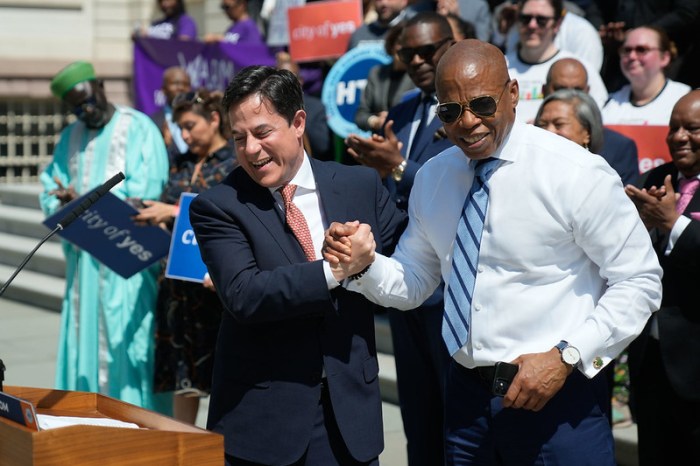
Sen. Chuck Schumer voiced optimism for a solution for Dreamers while attending an exhibition about the internment of Japanese-Americans during World War II at the International Center of Photography Museum on Friday.
“The president has put pen to paper, and it is horrible. His attitude toward immigration I have to call despicable,” Schumer said of President Donald Trump’s offer to extend protections for Dreamers in return for sharp immigration limits. “We are finally getting our Republican friends to discuss this. . . . We are optimistic that we will find a solution for Dreamers.”
Democrats and immigrant advocates have slammed Trump’s proposal to support a path to citizenship for up to 1.8 million Dreamers in exchange for funds for his border wall proposal, an end to the diversity visa lottery, sharp limits on family migration and more. United We Dream Advocacy director Greisa Martínez Rosas likened the offer to a “white supremacist ransom note.”
Schumer applauded immigrants’ contributions to America and urged attendees to welcome them — and to fight back.
“This couldn’t be more timely,” Schumer said, of “Then They Came for Me: Incarceration of Japanese Americans during World War II,” on view at ICP at 250 Bowery until May 6.
The exhibit features more than 147 objects that detail the period from 1942 to 1946, when more than 120,000 Japanese-Americans were detained in internment camps in the country, according to a statement from organizers. In largely black and white photos, the show, which was first curated by Alphawood Gallery in Chicago, depicts life before Pearl Harbor, during internment and after resettlement, according to ICP.
Works include those of American photographers Ansel Adams and Dorothea Lange, and Japanese-American Toyo Miyatake, in addition to artifacts from the time and video testimonies of those interned.
Taken through the exhibit by associate curator Susan Carlson, Schumer peered over photos of Japanese-American children, and said, “Look at these kids. They are no different from the Dreamer kids who came.”
He vowed to advertise the show on his website, and urge his colleagues in New York to do the same.
“[The exhibition] will strengthen our beliefs in New York as a great center for immigrants,” Schumer, who first saw the exhibition in Chicago, said. “I hope that hundreds of thousands of people see it.”
































